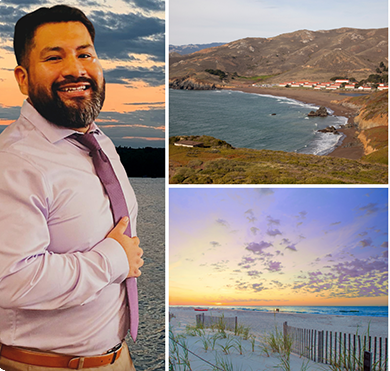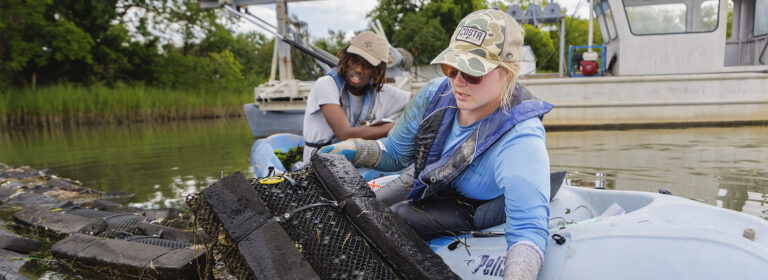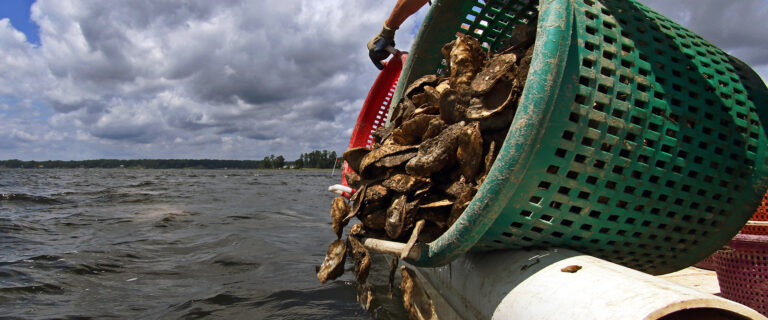Two students join Virginia Coastal Policy Center as Sea Grant summer interns
Janaya Belcher and Zachary Evans will join the group of students interning with the Virginia Coastal Policy Center (VCPC) at William & Mary Law School this summer. They will assist with projects related to the Resilience Adaptation Feasibility Tool (RAFT), a collaboration between VCPC, Old Dominion University, and the University of Virginia. The RAFT team assists coastal towns and counties with improving resilience to flood hazards. Belcher and Evans join a cohort of other summer interns at VCPC that includes law students, master’s students in public policy and public administration, and an undergraduate student.
“We have really enjoyed getting a ton of different perspectives,” said Gray Montrose, the assistant director of VCPC. “Everyone brings a breadth of opinion, breadth of information, and all these different viewpoints.”

Janaya Belcher is a rising third-year undergraduate student at Xavier University and a Sea Grant Community Engaged Internship participant. She studies biology with minors in chemistry and public health as a pre-medicine student. During Belcher’s internship, she will connect with coastal communities that have previously participated in the RAFT, and explore how the RAFT process could be adapted to better serve new communities.
“I’ve been going through some of the older projects that they have been working on and seeing what else we can do to support those communities,” she said. “I’ll be working with some of the more inland communities as well.”
Belcher, who was born in Washington, D.C., grew up in Northern Virginia, and went to high school in Hampton, Virginia. While attending college in New Orleans, she gained an appreciation for emergency response and flood-related resilience.
“Louisiana gets hit all the time with different disasters, and communities build back up after each one,” she said. “It’s really cool to see all the different aspects and how people work together to make sure that the communities flourish, which is very difficult, especially amongst covid.”
Belcher plans to pursue a master’s degree after graduation in public health with an emphasis on public health communication. Her interest in this field deepened during the pandemic, when she saw how some communities couldn’t access health information, or did not feel comfortable using that research to make informed health decisions for themselves. She would like to help make public health information more accessible.
“I thought this internship would allow me to get more experience with environmentalism and different topics that can intersect with public health,” Belcher said. “This is a great opportunity to do some outreach and learn a lot more about how legal systems work.”
Zach Evans is a rising second-year law student at University of Albany, and a Sea Grant Law Diversity Internship Program participant. During his summer internship, he will work with the National Sea Grant Law Center and VCPC.
Prior to starting law school, Evans spent four years working at the National Wildlife Federation in Washington, D.C. His work there focused on digital advocacy, including engaging people online and writing website content, blog posts, and social media while communicating about environmental issues. Evans was born in Chile, and grew up in New York. During law school, he said he hopes to gain a better understanding of environmental law and policy.
“Climate change is a huge issue, and there are so many different types of law that intersect with that — everything from traditional land use, financial regulation, and public finance, or how a city funds these projects to improve resilience,” Evans said.
During the internship, Evans will write summaries and reports about court cases focused on coastal, marine, and Great Lakes resources for the National Sea Grant Law Center. He will also work on projects related to the Resilience Adaptation Feasibility Tool (RAFT) for VCPC.
During this internship and beyond, Evans said he hopes to add to the diversity of voices in environmental law and policy, and be a resource to other people of color and LGBTQ people of color in the field. After completing law school, he would like to find an opportunity in environmental policy.
“The wider variety of voices that are involved in policymaking make policy stronger, and make it better for everyone,” he said.






